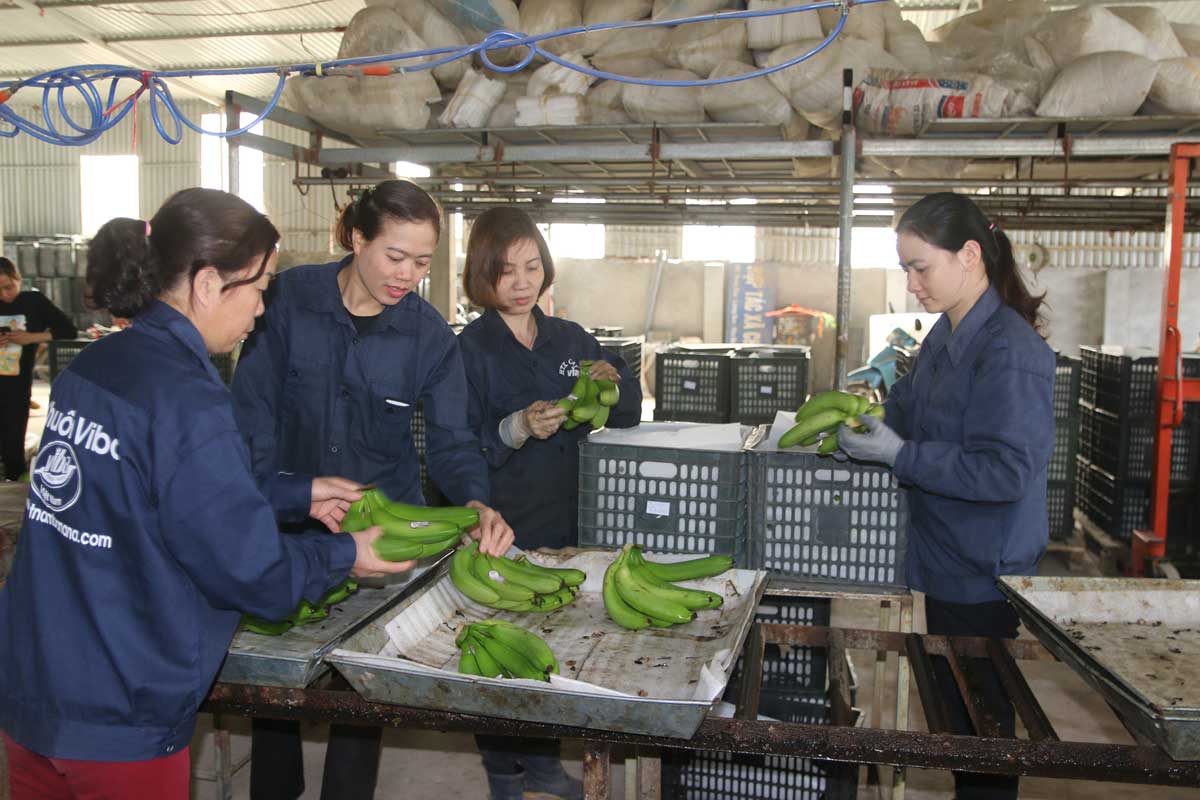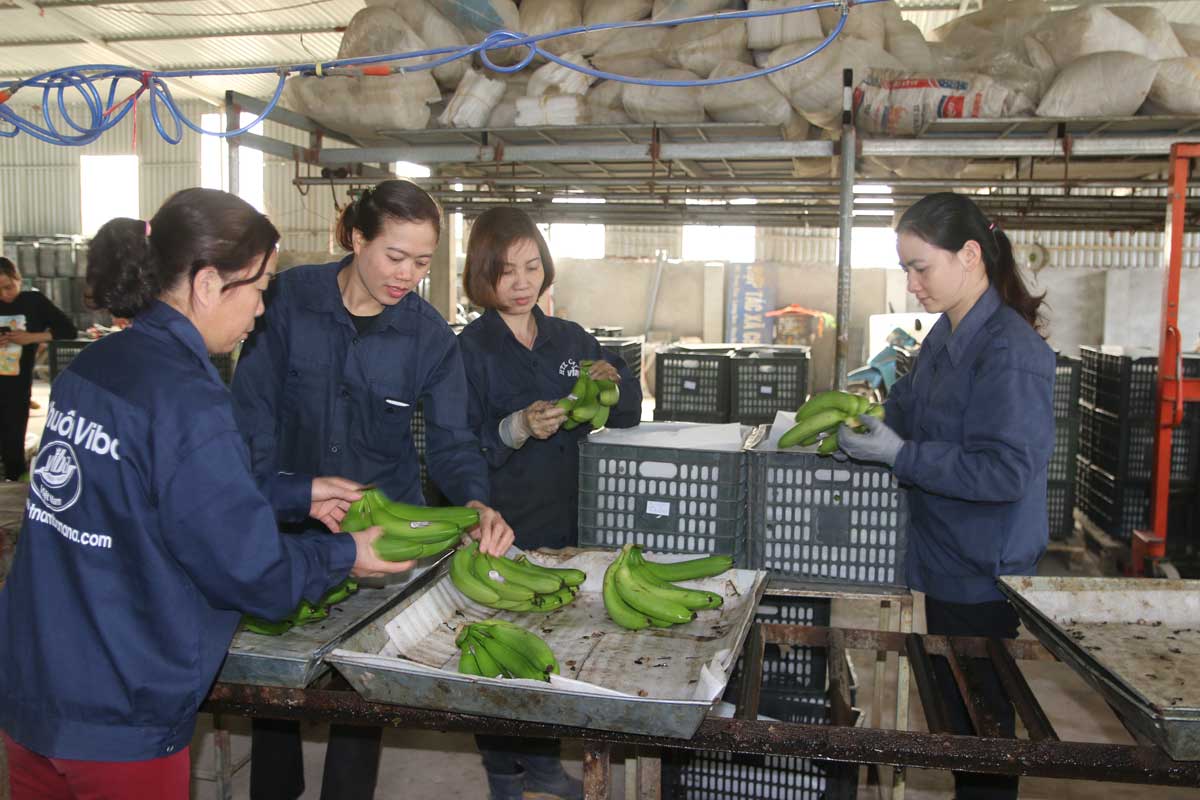
(HBO) - The provincial People’s Committee of Hoa Binh province has recently approved a project to develop local key farm produce during 2020-2025 with a vision until 2030, with a view to boosting local trade and enhancing exports.
 Banana of Viba banana cooperative in Luong Son district’s Lien Son commune is recognised as a three-star OCOP product at the provincial level. The cooperative’s banana is cultivated under VietGAP standards, and it is striving to bring its banana to the world.
Banana of Viba banana cooperative in Luong Son district’s Lien Son commune is recognised as a three-star OCOP product at the provincial level. The cooperative’s banana is cultivated under VietGAP standards, and it is striving to bring its banana to the world.
Accordingly, the province will develop its staples on the back of the fourth Industrial Revolution’s achievements, with focus placed on processing to improve their quality, added values, and competitive capacity. Besides, it will develop brands in tandem with environmental protection and sustainable development, and capitalise on free trade agreements, such as CPTPP and EVFTA, to expand markets.
The move aims to achieve an average export growth of key products by 18 percent during the 2021-2025 period, and 20 percent during 2026-2030.
Hoa Binh province targets 55 million USD from shipments of the products in 2025, and 137 million USD by 2030. The key agricultural products are envisaged to contribute 3.17 percent to the province’s total export revenue by 2025, and the figure will increase to 3.92 percent by 2030.
The products are expected to be shipped to traditional markets of Vietnam such as the US (accounting for 20 percent of total exports), the EU (25 percent), China (15 percent), Japan (10 percent) and the Republic of Korea (10 percent), and other markets (15 percent).
A wide range of measures have been outlined to achieve the set targets, with focus on trade promotion activities; policies to attract foreign investment to access state-of-the-art technologies and advanced management skills, and join the global value chains; application of cutting-edge cultivation methods; and development of efficient production models.
The provincial People’s Committee asked the Department of Industry and Trade to join hands with competent departments, sectors, and People’s Committees of districts and Hoa Binh city to work out mechanisms and policies to develop markets for agricultural products.
They are ordered to build brands and intellectual property as well as work to improve added-value chains for several agricultural products. Furthermore, they must carry out programmes to develop high-quality agriculture in line with planning to create abundant supply of raw materials, and products having competitive advantage for export./.
According to data from the Hoa Binh Provincial Party Committee, the industrial production index for the first six months of 2025 is estimated to have increased by 20% compared to the same period last year. This marks the highest year-on-year growth rate for this period since 2020.
In the first six months of 2025, Hoa Binh province’s export turnover was estimated at 1.145 billion USD, marking an 18.11% increase compared to the same period in 2024. Import turnover was estimated at $ 804 million, a 17.15% increase, which helped the province maintain a positive trade balance.
The lives of the ethnic minority farmers in Tan Lac district have gradually improved thanks to the new directions in agricultural production. This is a testament to the collective strength fostered through the professional associations and groups implemented by various levels of the district’s Farmers’ Union.
With the motto the "product quality comes first,” after nearly one year of establishment and operation, Muong village’s Clean Food Agricultural and Commercial Cooperative, located in Cau Hamlet, Hung Son Commune (Kim Boi district), has launched reputable, high-quality agricultural products to the market that are well-received by consumers. The products such as Muong village’s pork sausage, salt-cured chicken, and salt-cured pork hocks have gradually carved out a place in the market and they are on the path to obtaining the OCOP certification.
In the past, the phrase "bumper harvest, rock-bottom prices" was a familiar refrain for Vietnamese farmers engaged in fragmented, small-scale agriculture. But today, a new spirit is emerging across rural areas of Hoa Binh province - one of collaboration, organisation, and collective economic models that provide a stable foundation for production.
Maintaining growing area codes and packing facility codes in accordance with regulations is a mandatory requirement for agricultural products to be eligible for export. Recently, the Department of Agriculture and Environment of Hoa Binh province has intensified technical supervision of designated farming areas and packing facilities to safeguard the "green passport" that enables its products to access international markets.



 Banana of Viba banana cooperative in Luong Son district’s Lien Son commune is recognised as a three-star OCOP product at the provincial level. The cooperative’s banana is cultivated under VietGAP standards, and it is striving to bring its banana to the world.
Banana of Viba banana cooperative in Luong Son district’s Lien Son commune is recognised as a three-star OCOP product at the provincial level. The cooperative’s banana is cultivated under VietGAP standards, and it is striving to bring its banana to the world.